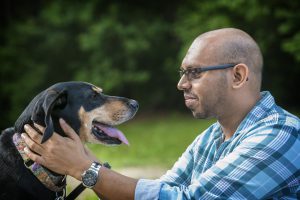
Stony Brook, NY; Stony Brook University: Department of Ecology and Evolution Assistant Professor Krishna Veeramah. His research was published online on July 18, 2017 in Nature and his study reveals origin of modern dog has a single geographic origin. canine, dogs,
The University Libraries is pleased to announce its second lecture of the fall 2017 STEM Speakers Series presented by Dr. Krishna Veeramah, Department of Ecology and Evolution. His talk, “Ancient European Dog Genomes Reveal Continuity Since the Early Neolithic” will be given on Tuesday, October 3 from 1pm-2pm in the Special Collections Seminar Room, located on the second floor of the Melville Library.
Dogs were the first animal to be domesticated by humans, with all current evidence pointing to grey wolves as the likely ancestral species from which they descend. The oldest dog fossils that can be clearly distinguished from wolves are found in Germany around ~15kya, but the archaeological record is notoriously ambiguous, with contentious claims for much older specimens as far east as Siberia. More recently, analysis of genetic data from modern dogs has proved even more puzzling, with different groups suggesting Europe, Central Asia, the Middle East and South Asia all as possible origins of dog domestication. This is in part a result of the confounding effect of the extreme bottlenecks introduced by Victorian breeding.
To understand the genetic relationship of ancient and modern dogs and the origins of dog domestication, Dr. Veeramah and his research team analysed whole genome sequences from the remains of two Neolithic dogs found at archaeological sites in Germany (aged around 7,000 years old and around 4,700 years old) and a third, previously described dog from Ireland (around 4,800 years old). They showed that ancient dogs and modern European dogs have common genetic roots, and there is a genetic continuity of domesticated dogs over the past 7,000 years from the Early Neolithic period to today. Based on these data, they propose that dog domestication took place between 20,000 and 40,000 years ago with a single geographical origin. In addition, they have begun to find evidence that selection for genes involved neural crest development were key for the process of dog domestication.
All are welcome to attend. Please register here and join us for this special presentation.
Clara Tran
Email: clara.tran@stonybrook.edu
Latest posts by Clara Tran (see all)
- 2025 Fall Semester: Reference and Virtual Chat Services - August 22, 2025
- 2025 Spring Semester: Reference and Virtual Chat Services - January 26, 2025
- Nikita Soni, PhD student,on “Human-Centered Large Language Modeling” - November 26, 2024

